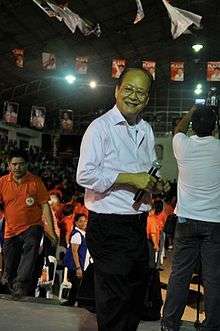Ernesto Maceda
Ernesto M. Maceda is a columnist and a Filipino politician who served as a Senator from 1971 to 1972 and again from 1987 to 1998. He served as Senate President from 1996 to 1998.
Early life and career
Maceda was born on March 26, 1935 in Pagsanjan, Laguna. Maceda earned his associate in Arts degree, Magna Cum Laude in 1952, and bachelor of Laws degree, Cum Laude, from the Ateneo de Manila University in 1956. He then finished Master of Laws, Taxation and International Law at Harvard Law School, Massachusetts, USA in 1957.
At the age of 23, he was hailed as the No. 1 Councilor of Manila in 1959. Because of his numerous achievements in the City Council, Councilor Maceda was named “Outstanding Councilor of Manila". In 1966, he served as the Presidential Assistant on Community Development and was the youngest Cabinet Member of the Marcos administration. In 1969, he was appointed Executive Secretary in concurrent capacity as Chairman of the Commission on Reorganization. In 1970, the Commerce and Industry portfolio was given to Maceda. In the post, he launched consumer protection programs and established trade relations with various Eastern European Social countries.
Senator of the Philippines
First term (1971–1972)
During the 1971 midterm elections, Maceda was only one out of three senators elected under the banner of the Nacionalista party of then-President Ferdinand Marcos. He took office on December 30, 1971. In 1972, Maceda’s bill granting protection to real estate buyers on installment basis[1] was the only bill signed into law before Martial Law was proclaimed. The bill is known as the Maceda Law. His term was supposed to have ended on December 30, 1977. He then went to exile in the United States after breaking with President Marcos over the Martial Law declaration and eventually became the adviser of the late Sen. Benigno S. Aquino. Following Sen. Aquino's assassination, he became one of the leaders of the opposition during the 1984 Batasan Pambansa Campaign and the 1986 snap presidential election.
Second term (1987–1992)
When Corazon Aquino was installed as President of the Philippines, he was appointed to head the Ministry of Natural Resources. The following year, he ran for the Senate under the Corazon Aquino's ticket and won. He served his second term as Senator from June 30, 1987 to June 30, 1992.
Third term (1992–1998)
During the 1992 general elections, Senator Maceda was re-elected under the Nationalist People's Coalition, which was a faction that bolted from the Nacionalista Party, headed by former Tarlac Governor Danding Cojuangco. Placing sixth in the senatorial race, he took office as Senator for a third time and served from June 30, 1992 to June 30, 1998. In his third term, he served as Senate President from 1996–1998.
Senate Presidency
On October 10, 1996, the Senate was re-organized and Maceda was installed as Senate President succeeding Neptali A. Gonzales, Sr. In November of that year, Senate President Maceda delivered a speech denouncing the PEA-Amari Scandal – calling the same as the "grandmother of all scams".[2] The PEA-Amari Scandal was a controversial deal involved the acquisition of 158 hectares of reclaimed land on Manila Bay that was to be converted into so-called Freedom Islands. The deal was forged as part of the Ramos administration's Manila Bay Master Development Plan (MBMDP).[2] During this time, he was also nicknamed "Mr.Expose." by the Philippine Free Press.
Post-Senate Presidency and Senate term
On January 26, 1998, he resigned as Senate President, citing loss of support by the majority of his fellow Senators. Then Senator Neptali Gonzales, whom Maceda helped installed to serve Senate President from 1992-1993 and 1995-1996 was once and for all elected as Senate President. Maceda, became the new Minority Leader of the Senate.
In February, 1998 months before his second and last term as Senator end, Maceda ran for mayor of Manila in the 1998 presidential elections, but lost. Senator Juan Ponce Enrile, then the Assistant Minority Leader of the Senate becomes the Acting Minority Leader even though he was also running for the presidency of the Philippines.
After his term in the Senate ended, Maceda was appointed Philippine Ambassador to the United States (1998–2001) by President Joseph Estrada.
In the 2004 elections, Maceda run for Senator,under the Koalisyon ng Nagkakaisang Pilipino of presidential candidate Fernando Poe, Jr., but lost. He ran again in the 2013 elections, but lost his bid to return to the Senate.
In 2007, he joined the Pamantasan ng Lungsod ng Maynila and became one of the professors of the PLM College of Law. Maceda holds the distinction of being the only Filipino to have held 5 Cabinet Positions in his lifetime.
He writes a column for the Philippine Star, entitled "Search For Truth" every Tuesday, Thursday and Saturday. He also hosts his radio talkshow "Mr. Expose" on radio station DZRJ 810 AM every Sunday from 8:00–9:30 AM.
External links and sources
References
- ↑ Joanne Almaden. "Defaulting Payments- Know Your Rights under Republic Act 6552 (Maceda Law)". PhilPropertyExpert.com. PhilPropertyExpert.com. Retrieved 3 October 2014.
- 1 2 PEA scandal
| Preceded by Neptali Gonzales |
President of the Senate of the Philippines 1996–1998 |
Succeeded by Neptali Gonzales |
